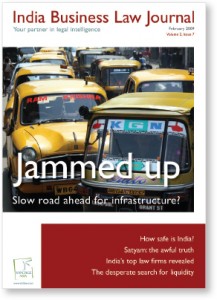Will India-focused businesses and law firms maintain their momentum, or will a year lived in fear be a year half-lived?
The new year has brought undeniable challenges, but also opportunities for those who are confident and persistent. This issue of India Business Law Journal reveals the current and future difficulties facing infrastructure development, one of India’s most urgent needs. In our Cover story (Jammed up), expert observers evaluate the government’s attempts to get stalled projects moving again with a package of measures including interest rate caps, subsidized loans and relaxed restrictions on external commercial borrowing. At a time when financial resources have been heavily depleted and private developers are exercising caution, the government’s boldness in pushing projects forward is reassuring and welcome.
India’s thirst for infrastructure finance remains unquenched. Traditional sources of funding may have dried up, but development costs have plummeted, real estate and raw material prices have fallen and the regulatory environment is perhaps more attractive than ever before. Lawyers and regulators alike must create channels to free the flow of liquidity.

If there was ever a time when regulatory intervention was desperately needed, it is now. The revelation of a spectacular fraud at India’s fourth-largest IT company has renewed many observers’ criticism of India’s regulatory apparatus. Though comprehensive on paper, measures for industry governance have often been poorly implemented and enforcement is weak. Our coverage of the Satyam scandal (The awful truth) investigates the fate of the company, its employees and shareholders, and considers how Satyam’s clients can protect themselves from the inevitable fallout. For the outsourcing industry at large, this sorry affair is a wakeup call: there is a clear need for increased scrutiny and transparency to prevent such mismanagement, and for greater attention to be paid to due diligence, in order to safeguard the stability and success of customers and providers alike.
While the Satyam debacle focused the world’s attention on financial security and corporate governance, the November terrorist attacks in Mumbai raised concerns over personal and operational safety in India. Security consultants report an increase in the number of requests for pre-travel advice. They also emphasize the need for companies to conduct security audits of their India-based operations and prepare disaster recovery and business continuity plans. Happily, our coverage (Occupational hazards) finds that few business and legal professionals have been deterred by the attacks.
In the face of harsh realities, energies are best channelled not into retreat, but into positive action to grasp opportunities for improvement and renewal. In this spirit, India Business Law Journal’s Indian Law Firm Awards are a testament to the success that comes from experience, expertise and hard work. We are proud to recognize and reward the talents of the best Indian law firms in 15 key practice areas, as well as the best overall firms.
Khaitan & Co takes home this year’s top prize of “law firm of the year”, a reflection of its impressive deal portfolio, glowing client references and its success in poaching two senior lawyers from a leading international firm (a first for India). Other outstanding firms that receive awards in several categories include Amarchand Mangaldas, AZB & Partners, Luthra & Luthra, Trilegal and J Sagar Associates. The awards highlight the commitment of practitioners in India, and their willingness to transcend transactional complexity in order to achieve the best results for their clients. It is such drive, fortitude and ambition that will continue to steer the country towards a bright future.
A democratic triumph has brought a new president to Washington. With him come new opportunities and challenges for India’s relationship with the US. Writing in this month’s Vantage point, Valérie Demont of Baker & McKenzie tells of the huge potential for bilateral cooperation in the energy sector following the approval of the US-India Nuclear Cooperation Approval and Nonproliferation Enhancement Act. The agreement allows India’s scientists to take part in international nuclear research, and opens up India’s multibillion-dollar market for the capital and
technology-intensive equipment to US companies.
Perseverance is necessary, even if change is slow to come. As AZB & Partners and Clifford Chance tie the knot (News), they exemplify the confidence and courage needed to forge key partnerships that will boost India’s business presence worldwide. No new endeavour is free of risk, but only those who keep climbing upwards give themselves a chance to reach new heights.



























